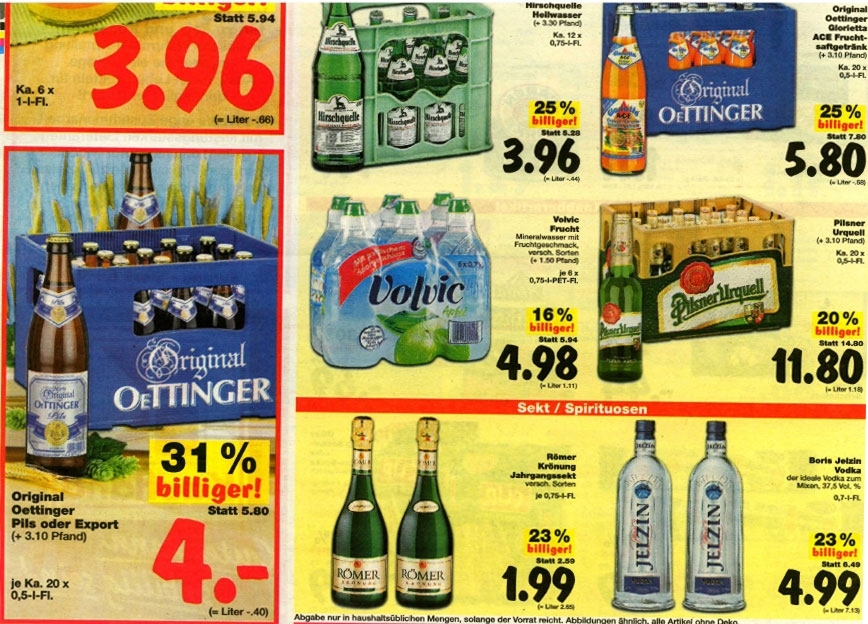How cheap can beer get?
In case you wondered how several of Germany’s major beer brands managed to keep or even raise sales volumes in a declining market, the answer is: through heavy discounting. In the month of December 2010 alone, ten beer brands (Beck’s, Bitburger, Radeberger, Warsteiner among them) witnessed over 10,000 price promotions all over Germany, twice the number of promotions they had in December 2009, says Drotax, a market research company.
But, as you will say, there’s promotions and promotions. Indeed.
Last time, Germany’s leading brewers issued a recommended retail price for their so-called national premium brands was in 2008 and the price bracket was EUR 12.45 to EUR 12.99 for a crate of 20 half-litre bottles of beer.
Since then, Germany’s consumers would have had trouble finding their favourite brands at such a price – yet they would have had no trouble finding it at a price promotion in any of Germany’s supermarkets selling at less than EUR 10.0 per crate.
In fact, national premium brands selling for less than EUR 9.0 per crate have become the norm rather than the exception.
Gfk, another market research company, reports that between 2003 and September 2010 the average promotion price for national pils brands has dropped to EUR 10.29 from EUR 10.53 per crate.
At the same time, the volume of all beer sold on offer has more than doubled to 63 percent (September 2010) from 27 percent in 2003.
It’s hardly surprising that Germany’s privately-owned brewing companies never report on their earnings. Expect them to have dropped significantly over the years.
The deteriorating pricing environment has equally affected Germany’s cheap beer producer Oettinger. Its brand Oettinger Pils also happens to be Germany’s top selling beer.
For two years in a row Oettinger’s sales volume has declined: 2 percent in 2009 (over 2008) and 4 percent in 2010. It’s now down to 6.3 million hl, says INSIDE, a trade publication.
Last year, at a German beverage industry gathering, Dirk Kolmar, the owner, complained that his brand is being attacked from above by the other national brewers. Oettinger resorted to its only means of defence: lowering its price.
This ultimately goes to show that the German Reinheitsgebot (purity law), initially intended to protect Germany’s brewers from foreign, non-Reinheitsgebot imports, has now proven their downfall.
Why should German consumers spend more on a premium brand if they can get the same quality for half the price? Moreover, why shouldn’t they shop around for offers if these have become ubiquitous?
No doubt, the future bodes ill for several major brewing companies. How much longer will they be able to sustain their heavy advertising spending which is estimated to have risen to EUR 400 million in 2010 (from EUR 350 million in 2009 because of the harsh economic climate), while lowering their prices?
Who will be the first to hit the proverbial wall? That is the question.
caption: To fight national premium beer brands which have been dumping prices for years, Germany’s cheap beer producer Oettinger has been forced to lower prices too. In 2010, Kaufland, a chain of almost 600 hypermarkets in Germany (owned by Schwarz Group which also runs the discounter Lidl), sold Oettinger beer for only EUR 4.0 (USD 5.45) per 10 litre crate, or 31 percent below its recommended retail price. Photo: Kaufland


